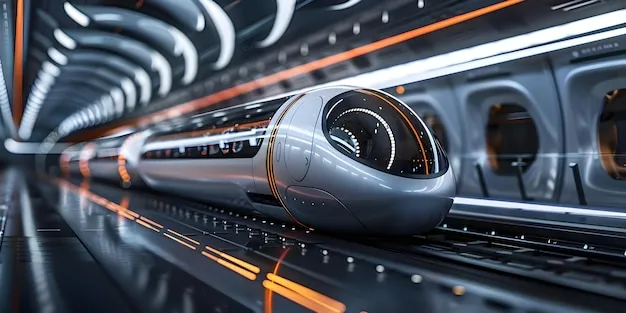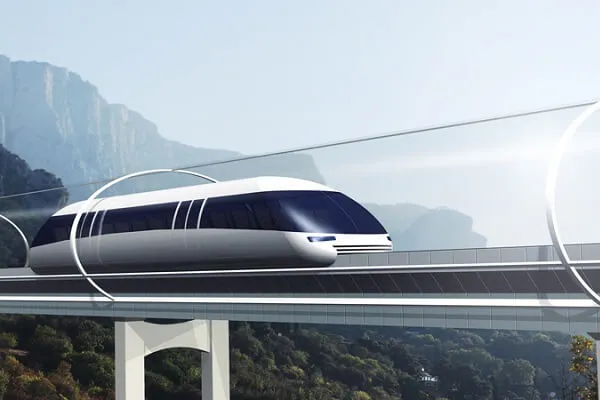The world of transportation is on the edge of a insurgency, and Hyperloop technology is at the center of this alter. With the potential to reach speeds of over 1,000 km/h, Hyperloop is being hailed as the future of high-speed travel. From decreasing travel time definitely to advertising economical transportation arrangements, it guarantees to rethink how individuals and merchandise move over cities and countries.
This point by point direct investigates what Hyperloop technology is, how it works, its preferences, challenges, and the future it holds for the worldwide transportation industry.
What is Hyperloop Technology?

Hyperloop technology is an progressed mode of transportation where cases or capsules travel at greatly tall speeds interior low-pressure vacuum tubes. The concept was to begin with proposed by Elon Musk in 2013 as an open-source transportation idea.
Unlike conventional trains or airplanes, Hyperloop dispenses with discuss resistance and grinding, permitting units to move much quicker with lower vitality consumption.
Read More: Exploring the Future of Transportation: A Comprehensive Guide to Other Hyperloop Rides
Key focuses around Hyperloop:
- Speed: Top speeds range from 1,000 to 1,200 km/h.
- Energy Effectiveness – Employments attractive levitation and renewable vitality sources like sun powered panels.
- Safety: Encased tubes lessen the possibility of mishaps and risks brought on by bad weather.
How Does Hyperloop Technology Work?
Hyperloop’s working component is based on three center technologies:
1. Vacuum Tubes
The units travel interior a fixed tube with exceptionally moo discuss weight, which diminishes discuss resistance significantly.
2. Attractive Levitation (Maglev)
The capsules drift over the track utilizing attractive levitation, lessening grinding between the case and the surface.
3. Electric Propulsion
- Linear acceptance engines move the cases forward at ultra-high speeds, and regenerative braking makes a difference moderate energy.
- The combination of these innovations makes Hyperloop quicker and more energy-efficient than any other current mode of transportation.
Advantages of Hyperloop Technology

1. Ultra-Fast Travel
Hyperloop can decrease a 500 km travel to fair 30 minutes, making it speedier than airplanes.
2. Vitality Efficiency
The Hyperloop is environmentally friendly and sustainable because it uses renewable energy sources like sun-oriented control.
3. Diminished Activity Congestion
By advertising high-speed intercollegiate travel, Hyperloop may decongest major thruways and urban roads.
4. Cost-Effective in the Long Run
Although beginning development is costly, long-term upkeep costs are anticipated to be moo due to negligible moving parts.
5. Security and Climate Independence
Being encased in a tube, Hyperloop is less influenced by climate conditions like rain, haze, or snow.
Challenges Confronting Hyperloop Technology
Despite its potential, Hyperloop innovation faces critical challenges:
1. Tall Development Costs
Building vacuum-sealed tubes over long separations requires gigantic investments.
2. Arrive Securing Issues
Obtaining arrive for long tracks can be troublesome, particularly in thickly populated regions.
3. Administrative Hurdles
Since it’s a modern innovation, governments require to make security directions and standards.
4. Security Concerns
Evacuating travelers in case of crises interior a fixed vacuum tube is a major concern.
5. Innovative Limitations
Maintaining near-vacuum weight in long tubes for expanded periods is actually challenging.
Top Hyperloop Ventures Around the World
Several companies are effectively working on Hyperloop technology.
1. Virgin Hyperloop (USA)
Virgin Hyperloop effectively tried a traveler ride in 2020, demonstrating the concept’s feasibility.
2. Hyperloop Transportation Advances (HTT)
HTT is creating full-scale models and working with governments to set up courses globally.
3. Zeleros Hyperloop (Spain)
Zeleros centers on adaptable and cost-efficient Hyperloop frameworks with negligible infrastructure.
4. Hardt Hyperloop (Netherlands)

In order to connect major cities, Hardt is developing a European Hyperloop Organization.
5. India’s Hyperloop Projects
The Maharashtra government and Virgin Hyperloop collaborated to build a Mumbai-Pune route that may cut the three-hour trip time to just twenty-five minutes.
Impact of Hyperloop on Transportation Industry
The selection of Hyperloop innovation can revolutionize the transportation industry:
- Intercity Travel – Cities associated through Hyperloop will encounter diminished travel time and progressed financial opportunities.
- Freight Transport – Hyperloop seem moreover transport products rapidly, lessening coordinations costs.
- Reduced Discuss Travel – Short-distance flights might gotten to be out of date due to quicker and cheaper Hyperloop rides.
Future of Hyperloop Technology
The future of Hyperloop innovation looks promising, with nonstop inquire about and speculations. Specialists anticipate that commercial operations may start by 2030 in chosen courses worldwide.
After administrative approvals, security requirements, and unrealistic concerns are resolved, the Hyperloop appears to have become the preferred medium-distance transportation option.
Conclusion
Hyperloop technology is set to rethink transportation by advertising ultra-fast, energy-efficient, and maintainable travel arrangements. In spite of the fact that it faces innovative, monetary, and administrative challenges, nonstop investigate and ventures are pushing it closer to reality.
With major players like Virgin Hyperloop and HTT driving the way, the future of travel seem before long move from thruways and airplanes to cutting edge vacuum tubes.
Frequently Inquired Questions (FAQs)
1. What is Hyperloop technology?
Hyperloop innovation is a high-speed transportation framework where cases travel interior low-pressure vacuum tubes utilizing attractive levitation.
2. How quick can Hyperloop travel?
It is predicted that hyperloop instances would achieve 1,000–1,200 km/h.
3. When will Hyperloop be accessible for open use?
Commercial Hyperloop operations may begin by 2030, depending on administrative endorsements and effective testing.
4. Is Hyperloop safe?
In hypothesis, Hyperloop is planned to be more secure than airplanes or trains, but large-scale security testing is still underway.
5. Which nations are creating Hyperloop?
The USA, India, UAE, and a few European nations are effectively working on Hyperloop ventures.

